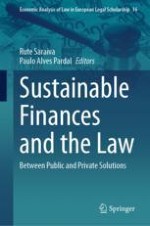2024 | OriginalPaper | Buchkapitel
The Climate Dimension of Fiscal Policy Sustainability: Best Practices in Green Budgeting and Lessons for Portugal
verfasst von : Carlos Fonseca Marinheiro, Amílcar do Rosário e Sousa, Ana Pinheiro
Erschienen in: Sustainable Finances and the Law
Verlag: Springer Nature Switzerland
Aktivieren Sie unsere intelligente Suche, um passende Fachinhalte oder Patente zu finden.
Wählen Sie Textabschnitte aus um mit Künstlicher Intelligenz passenden Patente zu finden. powered by
Markieren Sie Textabschnitte, um KI-gestützt weitere passende Inhalte zu finden. powered by
